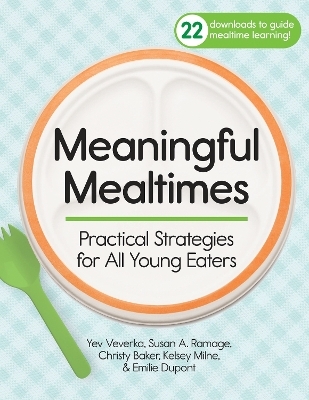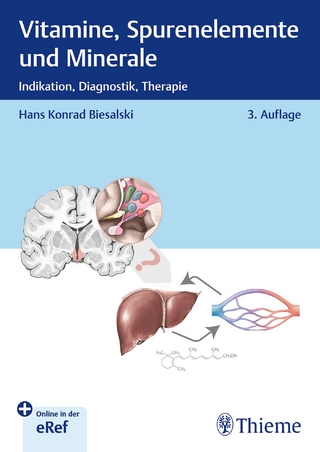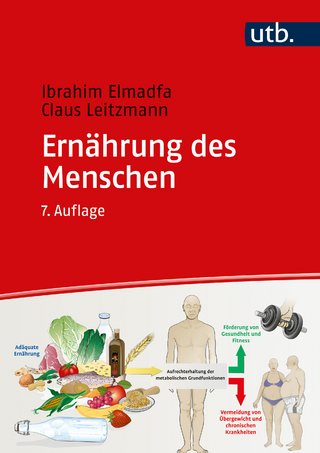
Meaningful Mealtimes
Brookes Publishing Co (Verlag)
978-1-68125-824-9 (ISBN)
Mealtimes are an integral part of our daily lives. They are moments when we come together to nourish our bodies, connect with others, and celebrate our cultures and identities. While eating is a fundamental human need, the significance of mealtimes goes far beyond the mere consumption of food. They are opportunities for connection, learning, and the creation of lasting habits. This book is born out of our deep appreciation for the potential richness of mealtimes and our desire to support children, families, and early learning providers in making the most of these moments.
Dr. Yev Veverka is a Behavior Analyst and Research Scientist at the University of Washington Haring Center for Inclusive Education. Yev received her B.A. in Psychology from the University of Minnesota and her M.Ed. in Early Childhood Special Education at the University of Missouri. She received her Ph.D. from the University of Washington in Early Childhood Special Education with an emphasis on Applied Behavior Analysis (ABA). Yev’s work as a Research Scientist at the Haring Center consists of projects related to early support for young children with developmental disabilities, enriching mealtimes in early learning settings, and the reform of practice of Applied Behavior Analysis. Yev also teaches courses in the ABA graduate program at the University of Washington. She co-owns and directs Align Behavioral Solutions, a platform dedicated to demystifying the science of behavior and making it accessible to all. Yev finds her most transformative role is that of being a mom to three children. This role has enriched Yev’s understanding of child development and caregiving, especially related to mealtimes beyond her professional and academic expertise. In her free time, Yev enjoys spending time outdoors and exploring new places with her husband, three children, and two dogs. Susan A. Ramage, R.N., M.N., Registered Nurse, Haring Center for Inclusive Education, University of Washington. Susan has been in the field of nursing for many years. Initial nursing experiences included time in inpatient settings at Harborview Medical Center and Seattle Children’s Hospital in Seattle, Washington, where she gained experience in surgery units. After completing her master’s degree at the University of Washington, she was able to work as a Clinical Nurse Specialist helping to support the pain management needs of pediatric patients at Seattle Children’s Hospital. A strong interest in the developmental needs of children led her to her nursing position at the University of Washington Haring Center. She has enjoyed working with all the children attending the center, including children with and without disabilities. Being able to work with the children’s families and support them in their parenting has offered opportunities to lead parenting classes and provide support that has allowed her to gain a deeper knowledge of the rewards and challenges parents feel in raising children. This has included struggles parents have felt in the area of feeding their child. She was able to connect with other clinicians associated with the Haring Center to discover ways of providing support to families and early childhood providers around feeding and mealtimes with the goal of providing environments in which children flourish and providers and caregivers feel listened to and supported. Christy Baker, B.S., Pediatric Occupational Therapist, Haring Center for Inclusive Education – Experimental Education Unit, University of Washington. Christy grew up in Portland, Oregon. She earned a bachelor’s degree in Psychology at the University of Oregon, and a bachelor’s degree in Occupational Therapy at the University of Puget Sound. She is practicing as a Pediatric Occupational Therapist in Early Support for Infants and Toddlers, working with children under the age of 3 and their families. For 20 years, Christy has provided therapy services at the Experimental Education Unit (EEU), an inclusive early learning program which is part of the Haring Center for Inclusive Education at the University of Washington in Seattle. Prior to that, she worked at Kindering Center Early Support Program in Bellevue, WA for almost 10 years. She has taken many continuing education courses and formal trainings over the years, focusing on various areas of development for children under the age of 3. Understanding the complexities of eating and working on feeding challenges quickly became a strong and favorite area of interest. Christy’s favorite aspect of working with younger children is having the opportunity to build meaningful connections with families, share ideas, and to help empower them to trust their instincts and ability to advocate for what they feel is best for their children and family. She enjoys collaborating and learning from her colleagues and with professionals in similar programs, and enjoys supporting children in toddler group classes, in their homes or daycare, and in other community settings. During her many years working closely with families, it became increasingly apparent that eating and challenging mealtime behaviors of children from birth up through kindergarten, were a big source of stress for many families at the EEU. Christy was fortunate enough to connect with several colleagues at the EEU who shared a passion about finding ways to support these families and guide children in feeling comfortable, safe, and accepted unconditionally while learning about news foods, eating, and joining in mealtime at home and in school. Christy’s interest in eating, and in feeding young children, more recently inspired her participation in training and networking with colleagues to support babies and their families in the transition from the hospital NICU to home. She received her Lactation Educator certificate this past year as well. When she is not working, Christy enjoys spending time with her family, and newfound joys of spending time with her young adult sons. She loves exploring her ancestry, being active outside, taking long walks while listening to music or books, cross-country skate skiing, and “treasure hunting” at vintage consignment and antique stores. Kelsey Milne, M.S., Speech-Language Pathologist, Haring Center for Inclusive Education – Experimental Education Unit, University of Washington. Kelsey grew up in Vancouver, Washington. She earned a bachelor’s degree in Speech and Hearing Sciences and a master’s degree in Speech-Language Pathology, both from the University of Washington. Very shortly after graduation, she began work as a speech-language therapist at the Experimental Education Unit (EEU), an inclusive early learning center in Seattle, Washington and part of the University of Washington Haring Center for Inclusive Education. She has remained there in all the years since! At the EEU, Kelsey has worked in the Early Support for Infants and Toddlers program, for children under age 3 and their families, and in the school’s preschool and kindergarten classrooms. She currently divides her time between the early support and kindergarten programs. In early support, her work focuses on family partnership and coaching to support children’s communication development in meaningful daily routines. In kindergarten, she works with families, students, and a transdisciplinary team of teachers and therapists to support diverse language learning styles and communication modes, and to find ways toward classrooms that welcome all children and families. Kelsey’s interest in feeding and mealtime support was sparked by wonderfully enthusiastic mentors at the EEU and by many families who candidly shared the stresses of mealtime, and who supported their children toward mealtimes that felt calmer and more comfortable with great creativity. Over the years, she has come to love mealtimes that offer fascinating explorations of the human body, scientific topics of all kinds, and the many diverse ways of living and eating in our world; she has also come to appreciate the many complexities and challenges posed by the mealtime experience. She hopes that this book will spark interest in both the complexity and possibilities of mealtimes and will support people in finding the mealtimes that fit them best. When she is away from the office and the computer, Kelsey loves wandering the windy beaches of the Northwest, finding a sunny corner for reading, riding her bike, and meandering walks and talks with her friends and family. Emilie Dupont,M.Ed., Special Educator, Haring Center for Inclusive Education – Experimental Education Unit, University of Washington. Emilie grew up in Oakland, California. She holds a master’s degree in Early Childhood Special Education from the University of Washington and a bachelor’s degree in Psychology from the University of Puget Sound. She is an educator working in early support for infants and toddlers, as a service provider for children under age 3 and their families. For over a decade, Emilie has taught toddlers at the Experimental Education Unit, which is part of the Haring Center for Inclusive Education at the University of Washington in Seattle. Prior to that, she worked in research for several years at the University of Washington Autism Center. Emilie values collaboration and ongoing learning. She has mentored many pre-service teachers, participated and presented as a Hub member in a collaboration-focused Extension for Community Healthcare Outcomes (ECHO) group, and is currently leading a Community of Practice for early childhood mentor coaches in King, Pierce, and Snohomish counties in Washington state. As an early childhood special educator, her career has focused on creating inclusive early learning settings where all children can thrive and all families are welcomed and celebrated. She believes it is our responsibility as early childhood professionals to create supportive environments where meaningful connections are forged and children’s unique needs are met. While Emilie has spent much of the last decade in a toddler classroom, she currently also works with families one-on-one in home and community settings as well as virtually, providing coaching and support to help families work toward their priority goals. Mealtime-related challenges and goals have come up consistently as a priority for families, and Emilie enjoys partnering with families to meet their child’s needs and work toward their mealtime vision as a family. When she is not working, Emilie loves cooking with her son and husband and bringing people together for any type of celebration. Growing up, food was a central part of family gatherings, and cooking is one way Emilie likes to show care for her friends, neighbors, and family. She loves connecting with others and learning about people’s cultural and family histories through food. Emilie hopes that this book will allow you to learn something about yourself and the children and families you work with, build community through mealtime, and take steps to affirm, accommodate, and appreciate the individual strengths, interests, and needs of every child.
About the DownloadsAbout the Authors
Acknowledgments
Introduction
I Making the Most of Mealtime
1 Introduction to the Tiered Approach
2 Defining Mealtime Challenges
3 The Big Picture
II Gathering Information, Setting Goals, and Assessing Progress
4 Starting with Self-Reflection
5 Gathering Information About Your Setting
6 Gathering Information About Children and Families
7 Goal Setting
8 Assessment and Decision Making
III Strategies for Supporting All Children at Mealtime
9 Building the Foundation for Supported and Fulfilling Mealtimes
10 Supporting Communication and Conversation
11 Encouraging Mealtime Participation and Food Interactions
12 Incorporating Additional Goals and Curriculum Content
13 Bridging Connections Between Home and Early Learning Settings
14 Problem Solving and Next Steps
Appendix A For Further Exploration
Appendix B Additional Resources
References
Index
| Erscheinungsdatum | 18.09.2024 |
|---|---|
| Verlagsort | Baltimore |
| Sprache | englisch |
| Maße | 216 x 279 mm |
| Themenwelt | Medizin / Pharmazie ► Gesundheitsfachberufe ► Diätassistenz / Ernährungsberatung |
| Medizin / Pharmazie ► Medizinische Fachgebiete | |
| Sozialwissenschaften ► Pädagogik ► Sonder-, Heil- und Förderpädagogik | |
| Sozialwissenschaften ► Pädagogik ► Vorschulpädagogik | |
| ISBN-10 | 1-68125-824-2 / 1681258242 |
| ISBN-13 | 978-1-68125-824-9 / 9781681258249 |
| Zustand | Neuware |
| Haben Sie eine Frage zum Produkt? |
aus dem Bereich


